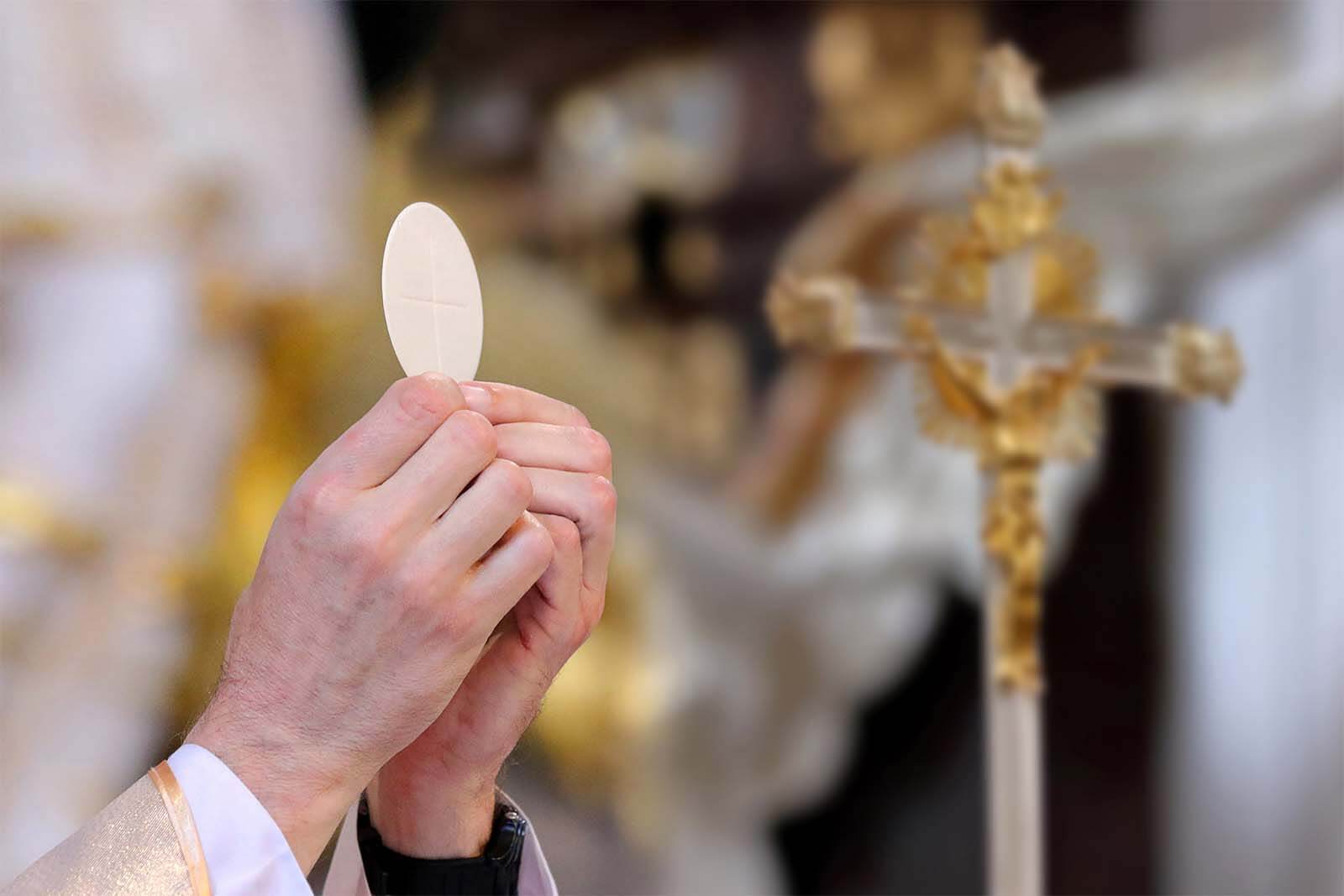We have been covering the Eucharist: the Sacrament of God’s trinitarian love. As Pope Benedict XVI says:
“The sacrament of charity, the Holy Eucharist is the gift that Jesus Christ makes of himself, thus revealing to us God’s infinite love for every man and woman… The first element of Eucharistic faith is the mystery of God himself, trinitarian love… The Eucharist reveals the loving plan that guides all of salvation history. There the Deus Trinitas, who is essentially love, becomes fully a part of our human condition.” The Sacrament of Charity (Sacramentum Caritatis), 1,7,8.
In the Eucharist, we find three distinct outward sacramental signs by which God confers grace. This makes the Eucharist a trinitarian Sacrament wherein each person of the Blessed Trinity shows his “infinite love for every man and woman.” Pope Francis describes God’s Eucharistic desire for us:
No one had earned a place at that Supper. All had been invited. Or better said: all had been drawn there by the burning desire that Jesus had to eat that Passover with them. He knows that he is the Lamb of that Passover meal; he knows that he is the Passover. This is the absolute newness, the absolute originality, of that Supper, the only truly new thing in history, which renders that Supper unique and for this reason “the Last Supper,” unrepeatable. Nonetheless, his infinite desire to re–establish that communion with us that was and remains his original design, will not be satisfied until every man and woman, from every tribe, tongue, people and nation (Rev 5:9), shall have eaten his Body and drunk his Blood. And for this reason, that same Supper will be made present in the celebration of the Eucharist until he returns again (Desiderio Desideravi, 4).
First, the Eucharist is the Sacrament of our heavenly Father’s love for us. A good father not only gives his children life, he also shows his ongoing love by providing for and protecting their life. A good father works hard to put food on the table, to be a breadwinner. God the Father is no different, as Jesus teaches us:
“Truly, truly, I say to you… my Father gives you the true bread from heaven. For the bread of God is that which comes down from heaven, and gives life to the world… he who believes has eternal life. I am the bread of life. Your fathers ate the manna in the wilderness, and they died… I am the living bread which came down from heaven; if anyone eats of this bread, he will live forever; and the bread which I shall give for the life of the world is my flesh.” John 6:32–33, 47–51.
Under the appearance—outward sign—of ordinary food God the Father gives his children the Body, Blood, Soul, and Divinity of his only–begotten Son, so that whoever believes in this Real Presence
would feed their souls with eternal life. God is truly a loving father who loves us by providing us with spiritual food: faith in the Real Presence feeds our souls.
Second, the Holy Sacrifice of the Mass is a distinct sacramental sign whereby the Son loves us: “Greater love has no man than this, that a man lay down his life for his friends” (John 15:13). When the bread and wine are consecrated at Mass, we have Christ’s Body and Blood on the altar. Yet his Blood is separate from his Body, making present in a sacramental manner Christ’s death on the Cross—this is what happens when one separates the blood from the body. In the Mass we experience Jesus loving us “unto the end,” hearing with our own ears his last cry: “Father, into your hands I commit my spirit” (Luke 23:46).
Third, the Holy Spirit shows us his love by uniting us to Christ. As the Holy Spirit is the Bond between the Father and the Son, he also bonds us to Christ when we receive Communion and we sacramentally become one body with him:
“But he who is united to the Lord [who receives the Lord in Communion] becomes one spirit with him… Do you not know that your body is a temple of the Holy Spirit within you, which you have from God? You are not your own; you were bought with a price. So glorify God in your body” (1 Corinthians 6:17–20).
So, we can experience the personal love of each person of the Blessed Trinity through this Sacrament of trinitarian love. Let’s thank and glorify God for it and try to live a life worthy of this great gift.

